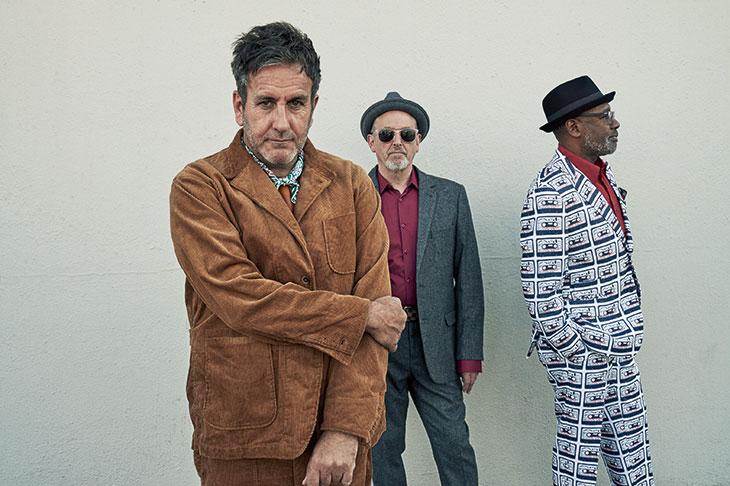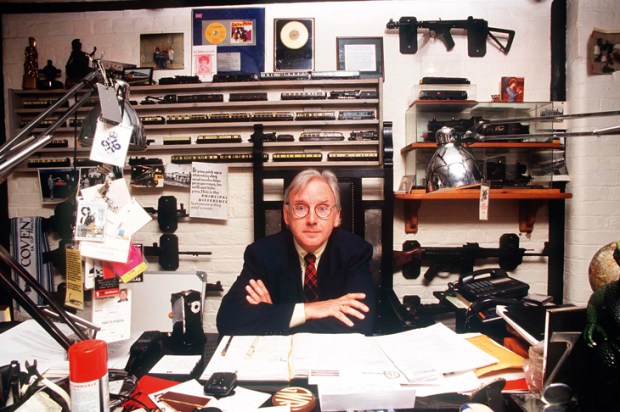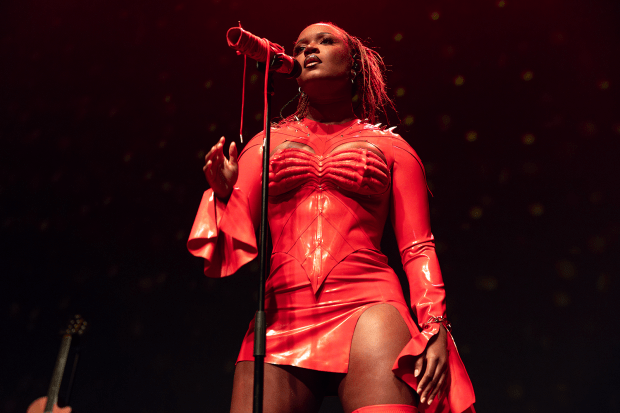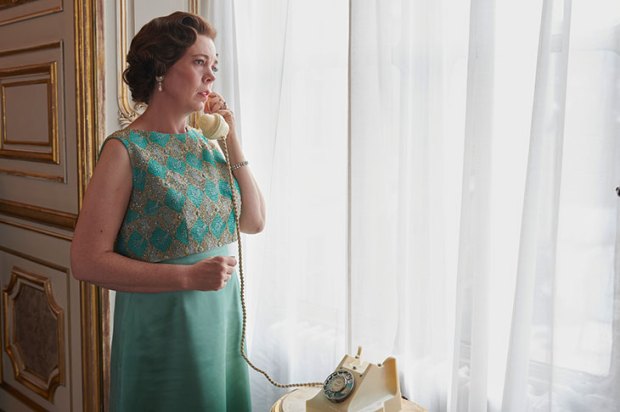It was summer 1981, and the towns and cities of Britain were alight. There had been riots in Brixton, south London, that April and on 10 July there were more — and not just in Brixton. Other parts of the city followed. And so did a long list of other places, from the unsurprising — Sheffield, Preston, Leicester — to the ones where the idea of a riot might have been expected to have disappeared with Captain Swing: Cirencester, Aldershot.
‘I was sitting in my flat watching the news, the riots happening all over the place,’ says Horace Panter, the bass player of the Specials. ‘And “Ghost Town” was No. 1.’ ‘Ghost Town’ was the Specials’ masterpiece — the one that sealed their reputation as one of the great British bands. It is a nightmarishly drunken piece of music, haunted funfair reggae that predicted the violent rage spreading through desolate British towns.
Encore, their latest and the first album Hall has made with the Specials in 38 years, emerges at a barely less febrile time, when once again, as ‘Ghost Town’ noted, ‘the people getting angry’. It’s unlikely that it will soundtrack the times as the Specials did from 1979 to 1981, when a string of singles managed to be both gloriously danceable and grimly realistic about how crappy the world was, especially if you lived in Coventry. But it’s no less engaged with the world, despite its makers’ disgust with that world.
‘I still feel politically engaged,’ Hall says. ‘But engaged in confusion, really. I come from a very strong Labour background, and in the past 20 years my love of the Labour party has dropped and dropped. And now, especially, it’s really dropped. And so I question my vote. Because I would have blindly voted Labour when I was 22, but now I wouldn’t. I think the likes of Jeremy Corbyn and Diane Abbott don’t help.’
I suggest that when surveying parliament at the moment, it appears to be a place where donkeys are led by donkeys. It doesn’t offer a lot of hope. Panter, laughs. ‘I’m glad you said that. Because that’s how I feel.’
One of the songs on the new record, ‘The Life and Times (of a Man Called Depression)’, deals with one of the constants of Hall’s life: mental illness. ‘I had suffered properly since I was 12,’ he says. ‘I’ve had problems since then, sometimes huge. By my mid-twenties I had a really bad breakdown, but I was reluctant to take medication because my only experience was when I was 13 and the GP prescribed Valium. Which meant that I was addicted to Valium. Which meant I didn’t go to school, I didn’t do anything. I just sat on my bed rocking for eight months. Twelve years ago it was really serious, so I started taking medication. And it’s been amazing. Now I don’t get those huge episodes.’
In his thirties, Hall self-medicated with gin, and became an alcoholic as a result. For the past 12 years it’s been pills. ‘The lovely thing about taking anti-psychotic pills is that the desire to kill a family of four just disappears,’ Hall says. ‘Which is great.’
He laughs. I don’t know if he’s joking. The cause of Hall’s depression, the reason he was given Valium as a child, was covered in an old song, ‘Well Fancy That!’, released in 1983 by Fun Boy Three. ‘It was about an episode where I was abducted, taken to France and sexually abused for four days. And then punched in the face and left on the roadside. At 12, that’s life-changing. I still have that illness today and I will still have it in ten years’ time, and it’s important for me to talk about that.’
So the Specials, first time round, had Hall’s depression — though no one talked about it — the dictatorial tendencies of original lead singer Jerry Dammers, and the combustibility that comes from having seven members with different tastes, from different backgrounds. ‘Some people didn’t do very much in the way of drink and drugs, some people smoked marijuana, some people took cocaine and amphetamines,’ Panter says. ‘So you had three different states at the same time in the same van. The people going far too fast are not going to get on with the people going really slowly. And then there were other people who didn’t take anything trying to balance the whole thing. It was very difficult. There were the different recreational activities, and we were from different classes as well. Brad [John Bradbury, drummer], Jerry and I had degrees in fine art. Neville and Lynval came over in the Windrush generation, and Terry and Roddy [Byers, guitarist] were the sons of working-class Coventry people. That was another reason the band split up, the different classes.’
And then there were the fans. The gigs the Specials played through 1979 and 1980 have been eulogised as some of the most exciting ever by a British band. But partly that was because of the danger that accompanied them: punch-ups in the crowds, confrontations with visiting National Front members, stage invasions. It all seemed incredibly exciting to those seeing it once, but less so when it was your workplace. ‘It was absolutely tragic when it stopped being fun,’ Panter says. ‘I didn’t like stage invasions. The second big tour we did, in England in 1980, I went onstage not looking forward to playing those songs. It was trepidation, wondering at which song we were going to get 250 of Cardiff’s finest on stage drunk, and then have to stop. Something that was joyous became a chore.’
And through it all, Hall would stand centre stage, unmoved, looking bored to tears, as he always did. As a kid, I found him faintly terrifying when the Specials appeared on Top of the Pops. He was breaking all the rules of television. Even the punk groups looked as though they were engaged, even if they were doing so in an odd way. But Hall looked like he didn’t care, and the people who don’t care are always the ones to be afraid of. ‘Well,’ Hall says, ‘I didn’t care. I still don’t care. I don’t find it necessary to smile or move. I don’t do that at home. Why should I do it at work? Plus, I don’t care. I honestly didn’t give it that much thought.’
Do you get any pleasure out of performing?
‘Absolutely none. That’s why I do it.’ He laughs gently. ‘I actually do enjoy that thing on stage where I turn round and I’ve got Horace and Lynval, who I’ve known most of my life, and we’re sharing something. That’s my night out. Don’t get out much.’
These days, it’s all much more convivial than it used to be. The Specials tour in a less frenetic manner. Hall observes that prescription drugs have replaced the non-prescription drugs. Panter notes that these days, because no one is speeding their nut off, it is possible for one member to suggest changes to a song without being given a black eye by someone else.
How different it all might have been had the Specials followed the advice of their first mentor. Their first demos were recorded by a local DJ in Coventry called Pete Waterman. ‘I remember him saying to me: “You’re the frontman. What you need to do is wear a black polo-neck jumper with some sort of gold around your neck that draws the people in,”’ Hall says. ‘He wasn’t around much after that.’
Got something to add? Join the discussion and comment below.
Get 10 issues for just $10
Subscribe to The Spectator Australia today for the next 10 magazine issues, plus full online access, for just $10.
You might disagree with half of it, but you’ll enjoy reading all of it. Try your first month for free, then just $2 a week for the remainder of your first year.














Comments
Don't miss out
Join the conversation with other Spectator Australia readers. Subscribe to leave a comment.
SUBSCRIBEAlready a subscriber? Log in